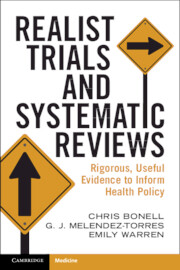Book contents
- Realist Trials and Systematic Reviews
- Reviews
- Realist Trials and Systematic Reviews
- Copyright page
- Contents
- Figures
- Tables
- Boxes
- Acknowledgements
- Chapter 1 Introduction
- Chapter 2 Why Are Trials and Systematic Reviews Necessary but Currently Insufficient to Inform Health Policy?
- Chapter 3 Realist Critiques and Manifesto for Evaluation and Reviews
- Chapter 4 Building Realist Theory in Evaluations
- Chapter 5 Refining Realist Theory through Process Evaluations
- Chapter 6 Testing Realist Theory through Trials or Other Evaluation Designs
- Chapter 7 Building and Refining Realist Theory in Systematic Reviews
- Chapter 8 Testing Realist Theory through Synthesising Outcome Evaluations
- Chapter 9 Using Evidence to Inform Intervention Scale-Up and Transfer
- Chapter 10 Using Evidence to Refine Middle Range Theory
- Conclusion
- References
- Index
Chapter 9 - Using Evidence to Inform Intervention Scale-Up and Transfer
Published online by Cambridge University Press: 08 February 2024
- Realist Trials and Systematic Reviews
- Reviews
- Realist Trials and Systematic Reviews
- Copyright page
- Contents
- Figures
- Tables
- Boxes
- Acknowledgements
- Chapter 1 Introduction
- Chapter 2 Why Are Trials and Systematic Reviews Necessary but Currently Insufficient to Inform Health Policy?
- Chapter 3 Realist Critiques and Manifesto for Evaluation and Reviews
- Chapter 4 Building Realist Theory in Evaluations
- Chapter 5 Refining Realist Theory through Process Evaluations
- Chapter 6 Testing Realist Theory through Trials or Other Evaluation Designs
- Chapter 7 Building and Refining Realist Theory in Systematic Reviews
- Chapter 8 Testing Realist Theory through Synthesising Outcome Evaluations
- Chapter 9 Using Evidence to Inform Intervention Scale-Up and Transfer
- Chapter 10 Using Evidence to Refine Middle Range Theory
- Conclusion
- References
- Index
Summary
This chapter explores how policymakers and practitioners in settings beyond the sites of evaluation might make use of evidence from realist trials and systematic reviews, plus local needs assessment, to identify the best candidate interventions for their local contexts. To do this, local decision-makers need to assess how likely are interventions to achieve benefits in their contexts. This is partly a matter of assessing whether interventions are likely to be feasible, accessible and acceptable in their settings, which will be influenced by local capacity and norms. It is also a matter of assessing whether intervention mechanisms will be triggered and whether these are likely to generate beneficial outcomes. This will be influenced by what aetiological mechanisms are generating adverse outcomes in the context and hence what vulnerabilities exist which the intervention may be able to address. It will also be influenced by whether the local context provides affordances so that potential beneficiaries may be able to benefit from the intervention. Thinking through these issues should enable local policymakers and practitioners to decide whether such interventions could be delivered immediately at scale, be implementing but only within evaluated pilot studies or be rejected in favour of other interventions.
Keywords
Information
- Type
- Chapter
- Information
- Realist Trials and Systematic ReviewsRigorous, Useful Evidence to Inform Health Policy, pp. 82 - 88Publisher: Cambridge University PressPrint publication year: 2024
